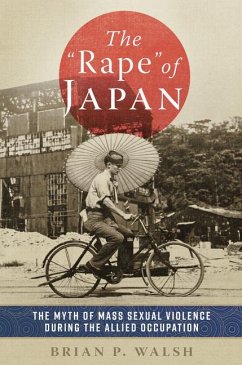Most Americans regard the postwar Occupation of Japan as a prime example of American magnanimity. They are blithely unaware of the prevailing Japanese myth that upon entering Japan, U.S. servicemen "engaged in an orgy of looting, sexual violence, and drunken brawling" and that during the first ten days of the Occupation there were 1,336 reported cases of rape in Kanagawa Prefecture alone. The myth goes further with claims that U.S. military officers demanded the Japanese government set up brothels for use by American troops and that when embarrassed officials in Washington, D.C., forced Occupation officials to close the brothels, the servicemembers went on a rampage, resulting in (according to official records) reported rapes of Japanese women skyrocketing from an average of 40 to 330 cases a day. The truth is that none of this happened. Nevertheless, large numbers of Japanese still believe these allegations. As the passions of war have faded, the currency of such stories has only grown, and they are now regarded by many as fact. This false narrative of mass sexual violence and the organized exploitation of Japanese women by American military forces is also widely accepted among historians of World War II and its aftermath. > Walsh sets the records straight, by showing that MacArthur's General Headquarters established women's rights on a more secure foundation than anywhere else in East Asia, provided a far safer physical environment than most other occupations, and all but eliminated endemic sexually transmitted diseases. These diseases ruined millions of lives, prematurely ending as many as five thousand per year, including those of more than a thousand children. The "Rape" of Japan is a long-overdue refutation and exposure of a relentless propaganda campaign that has persisted for more than seven decades.








